
Remember The Commish, starring Michael Chiklis who played Tony Scali, the young police commissioner of fictional Eastbridge, a suburb of New York City? His M.O. was to navigate problems with a mix of humor and innovation, as opposed to violence or brute force. Ironically perhaps, the show ran on ABC-TV from 1990 through 1996.
Scali described his approach to leadership as M.B.W.A. – management by walking around, a folksy, personal approach to connecting with his employees.
And then there’s the new “commish” of the incoming Trump Administration who has a decidedly different management style. Brendan Carr, who’s already turned up the volume at an agency not known for being proactive.
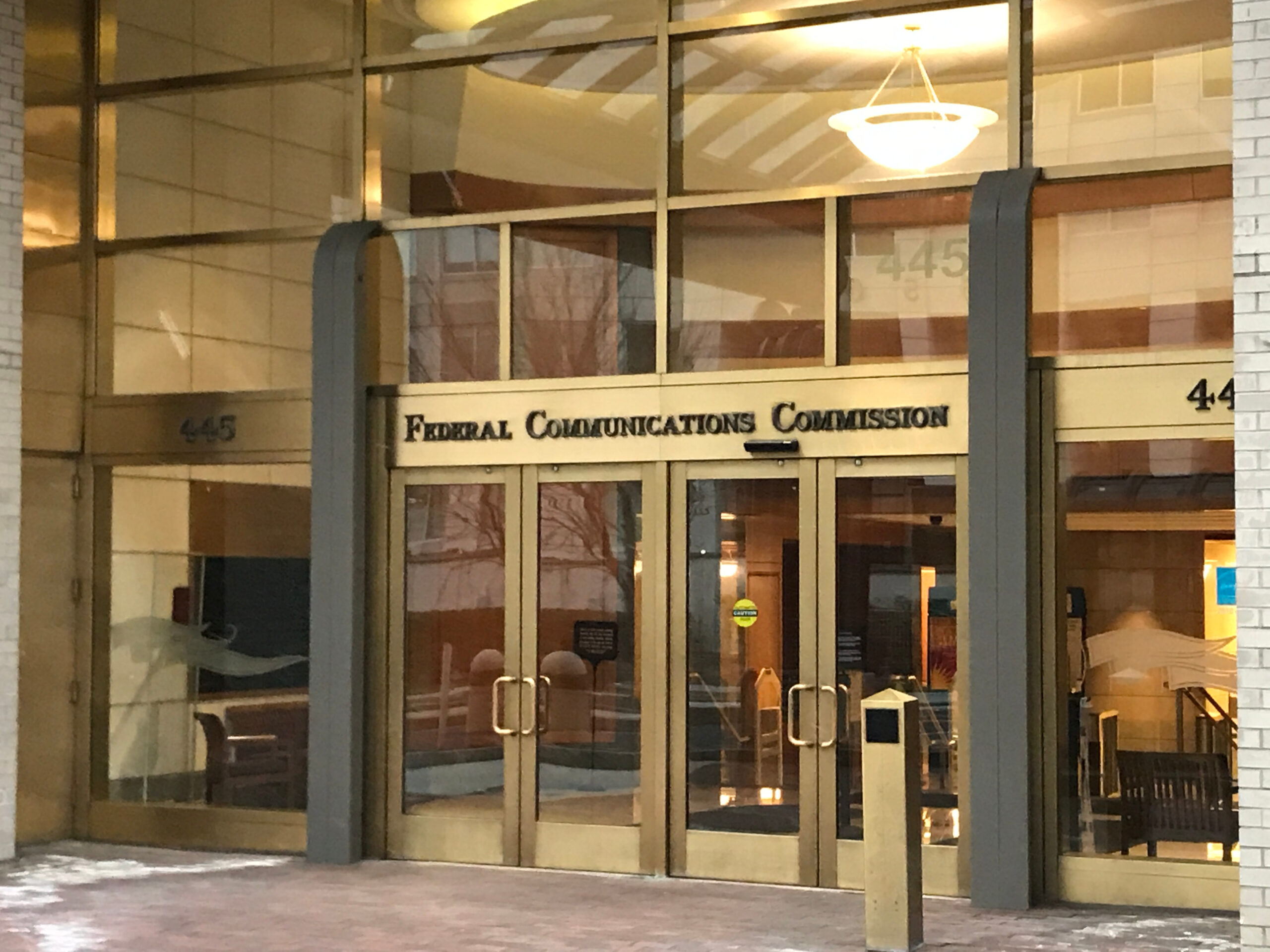 Does the FCC even matter at this juncture in broadcasting’s rollercoaster history? You bet it does, thanks in no small part to the steady rat-a-tat-tat coming from the Trump Administration’s pledge to remake government as we’ve known it, at least since FDR’s World War II era.
Does the FCC even matter at this juncture in broadcasting’s rollercoaster history? You bet it does, thanks in no small part to the steady rat-a-tat-tat coming from the Trump Administration’s pledge to remake government as we’ve known it, at least since FDR’s World War II era.
Problem is, no one knows exactly what it will all amount to. Of course, some pundits think they’ve got a good handle on the direction the new sheriff in town will take. But the one thing we’ve learned since Trump made his momentous political entrance at the synonymous tower he built on Fifth Avenue in New York City is that he’s anything but predictable. In fact, he’s the master of the head fake, the deke, and misdirection plays that often keep his own party and his staffers guessing over his next move.
But the “chattering class” loves the drama and the speculation. In fact, “What will the Trump team do about broadcast radio?” was discussed in seemingly every panel at last November’s “Forecast 2025,” put on by Radio Ink.
And as you read this post, Paul and I are now in Vegas, prepping for CES 2025 and our two sold-out tours, populated with curious, enthusiastic broadcasters representing commercial, public, and Christian radio, along with C-suite execs, digital mavens, consultants, and other interesting characters curious about how technology is rocking our world and how they can “control the controllables.” While most of our attendees are first-timers to CES, this year marks our 16th consecutive experience with this amazing event, including 2021 when the show went virtual due to the pandemic.
with C-suite execs, digital mavens, consultants, and other interesting characters curious about how technology is rocking our world and how they can “control the controllables.” While most of our attendees are first-timers to CES, this year marks our 16th consecutive experience with this amazing event, including 2021 when the show went virtual due to the pandemic.
In all these years, I cannot think of a single time when politics was one of the trends being discussed. If anything, CES has always struck me as a techie escape from the day-to-day grind of the current events cycle.
Until this year. As the experts, pundits, and media gather at the Las Vegas Convention Center and the other exhibit casino hotels along “The Strip,” you cannot get away from political speculation. While AI and gadgets are still the fuel that powers this amazing show, conversations about how Trump and his appointees might change the atmosphere that impacts the technology and media worlds.
For the past few weeks, some of the biggest tech companies – Amazon, Meta (Facebook), and Apple among them – have ponied up seven-figure contributions to the incoming President, including his library, his inauguration, and related political funds.
The New York Times estimates the take at north of $200 million since election day. In addition to aforementioned companies, Trump has received sizable contributions from OpenAI (ChatGPT), Pfizer, and several cryptocurrency firms.
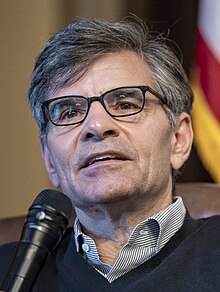
In perhaps a related case, Disney – owner of ABC – recently settled a pending defamation case between Trump and ABC over the George Stephanopoulos interview than took place in March of last year. Rather than battle out in court, ABC opted for the easier and more low-key solution – writing a $15 million check to Trump along with another $1 million in legal fees and calling it a day.
But as Disney/ABC’s CEO, Bob Iger, learned over the holidays, the case is far from over. That’s because the incoming chairman of the FCC, Brendan Carr, is already sending the message he’s going to make noise. Before he and Trump are sworn in, he is beginning to assert power to a regulatory body not famous for doing much boat rocking.
Carr, an attorney, worked directly for Chairman Ajit Pai before being appointed by President Trump in 2017 as one of the FCC’s five commissioners. Now Trump is elevating Carr to the top spot on the commission.
What you may not know is that President Biden reappointed Carr last year. The “commish” is expected to succeed current chairwoman Jessica Rosenworcel.
As Barack Obama was fond of saying, “Elections have consequences,” and this one most certainly will. But they may not be as predictable as many think. As the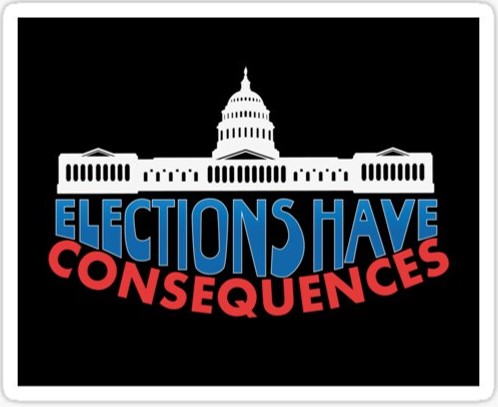 famous fabulist Aesop is credited with writing, “Be careful what you wish for.”
famous fabulist Aesop is credited with writing, “Be careful what you wish for.”
Understanding Carr’s POV to running the FCC could turn out to be an important pastime for broadcasters as they try to get a handle on his agenda. It turns out he wrote the chapter on the F.C.C. that was published in that now famous document from the Heritage Foundation’s “Project 2025.”
Among other issues, Brendan Carr has been vocal about banning TikTok because of national security concerns. In general, he has complained that social media in general has been biased against Donald Trump. Carr has also buddied up to Elon Musk, opposing efforts to block the billionaire’s original plans to buy Twitter.
And yet, Trump himself has volunteered to intervene in the TikTok kerfuffle in an effort to perhaps facilitate a sale to an American company, thus averting a ban in the U.S.
So, will the new administration be favorable to TikTok and its Chinese owner, Byte Dance, or will leaders like Carr and Trump take a punitive view?
Obviously, the signals are mixed. We likely aren’t going to know much until the peaceful transfer of power occurs in a couple weeks and Trump submits those change of address cards, moves back to his previous 1600 Pennsylvania Avenue address, and begins his agenda.
But it was Carr’s pointed letter to Iger that captured much attention – and minced no words. In addition to running the entire Disney operation, from the theme parks to the cruise line, the company also owns ESPN, along with the ABC Television network plus eight owned and operated TV stations in some of the biggest markets in the country.
It’s these O&O stations where Carr and the FCC have control – and are threatening to use it. Carr pulled no punches in accusing ABC of contributing to the “erosion of public trust” suffered by the national news media.
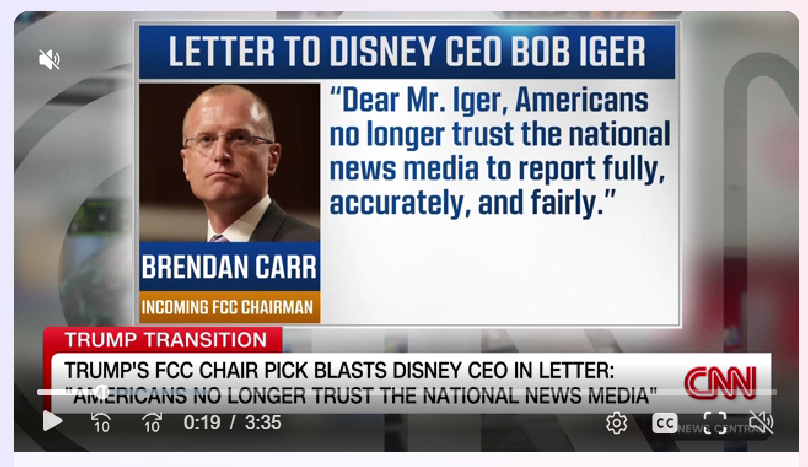
CNN’s Brian Stelter reposted Carr’s shot across the Mickey Mouse bow on his X page:
Here’s the full letter from incoming FCC chair Brendan Carr to Disney CEO Bob Iger about ABC’s negotiations with affiliates – and about trust in media writ large pic.twitter.com/ARO0onozcy
— Brian Stelter (@brianstelter) December 24, 2024
While these shots at Iger garnered most of the media attention, it was another pointed accusation in Carr’s missive to Iger that caught my attention.
Carr wrote that ABC is attempting to extract onerous financial and operational concessions from local broadcast TV stations under the threat of terminating long-held affiliations, which could result in blackouts and other harms to local consumers of broadcast news and content.”
In his letter to Iger, Carr made a strong statement on behalf of the importance of local stations and service to the communities to which they are licensed:
“Americans largely hold positive views of their local media outlets.”
And as a CNN analysis of Carr’s writings concludes, “He indicates support for more local programming.”
So what kind of implications could that stance have on how local television affiliate stations are programmed, as well as their emphasis on producing more of their own content?
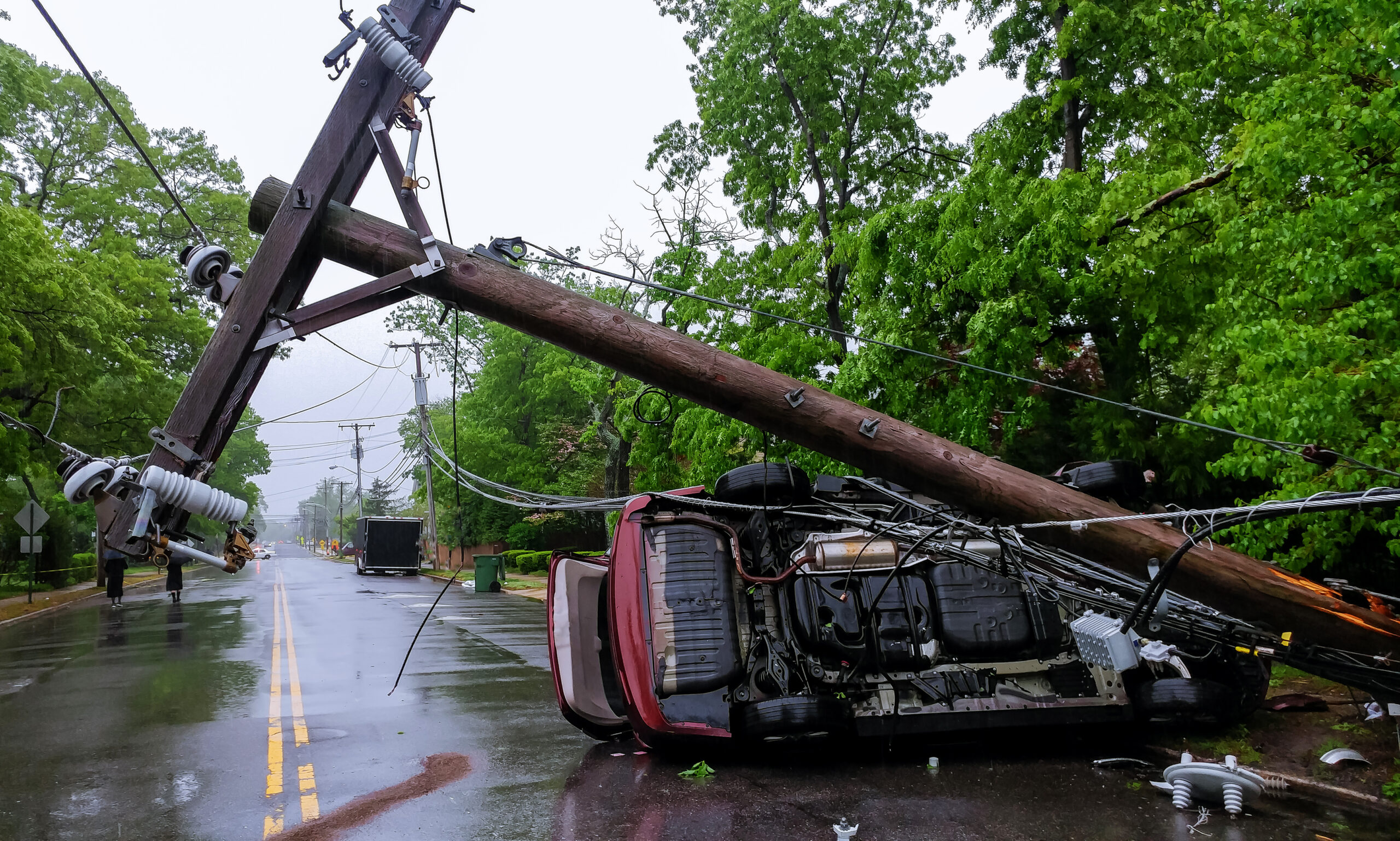 And why wouldn’t that premise carry over to local radio? Over the years, debates in Congress have revolved around just how much local programming radio licensees actually produce, especially during times of emergencies when communities need a lifeline from their hometown radio stations.
And why wouldn’t that premise carry over to local radio? Over the years, debates in Congress have revolved around just how much local programming radio licensees actually produce, especially during times of emergencies when communities need a lifeline from their hometown radio stations.
Did this incoming FCC chairman just signal a sea change in policy by the commission? Your guess is as good as mine – and that’s the point.
We are living in a time of acceleration – I know we will be feeling it this week at CES. Concepts you’d see at this show – especially in the automotive exhibits – were typically 3, 4, or 5 years from ending up in showrooms. Today, we’re seeing innovations coming to market faster than ever.
A more active FCC might have something to say about this, especially as the fast and furious onslaught continues. The progression, development, and implementation of AI in our media – especially broadcast might be yet another area where the commission weighs in – or even puts a finger on the scale. All those million dollar “contribution” checks signal something, don’t they?
Either way, those of us in broadcast radio would be wise to keep abreast of what Carr, the rest of the FCC, and other sundry members of the Trump Administration are saying about media, technology, and related issues. Decisions being made in D.C. affect us personally and professionally.
In the meantime, we might be pining for the even-handed charm of Tony Scali (a.k.a. Michael Chiklis) before too long. After all, he’s got the chops to be a “commish.”
- Will Radio Jump On TikTok’s “Silver Express?” - May 27, 2025
- Memorial Day 2025 – The Year Of Standing On Shaky Ground - May 23, 2025
- To Win In Radio, Make A Difference - May 22, 2025




“Even a blind pig sometimes finds a truffle.” Here’s hoping.
Thank you, Mr. Glass Half Full!
Some of these issues might also spill over now to the Federal Trade Commission.
Indeed.
Wouldn’t it be nice if more local programming was required ? If a station is licensed to Philadelphia or Podunk, it should serve the citizens of those places. Sadly, with the financial situation of many radio companies, local programming might be daily airing of high school morning announcements.
I think if anyone stopped to peruse the old Communications Act of 1934, Dave, that would indeed be the takeaway. Sadly, we’re light years beyond those tenets now.
It wouldn’t be surprising to see Carr press the same kind of philosophy on noncommercial broadcasting. I suspect, if Congress doesn’t nuke CPB funding altogether, Carr will press to see more of it be directed at local programming and possibly create more reporting requirements on public broadcasters. Sadly, it is highly unlikely Congress would provide any more funding to support the added burden, despite the U.S. providing one of the least per-capita amounts towards public broadcasting of any developed nation.
It IS a whole lot different overseas when it comes to public media funding, Frank. I don’t think that rationale is going to hold much water, however.
I think it bears mentioning, before someone cluelessly blasts President Biden for reappointing Carr, that by law the FCC must have at least two commissioners that are not from the same political party as the other three. Even if Biden had seen this coming, he would have had to replace Carr with another Republican, and who knows whether that would have been better or worse?
The real danger is that Rosenworcel’s term would have been up at the end of June and she has already said she would step down as of Trump’s inauguration, which means he will immediately be able to appoint a third Republican to the Commission.
Indeed, K.M. I do believe we’re going to start seeing the impact of this change quickly – like it or not.